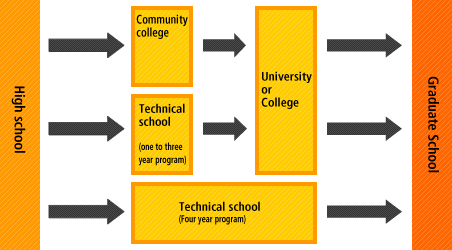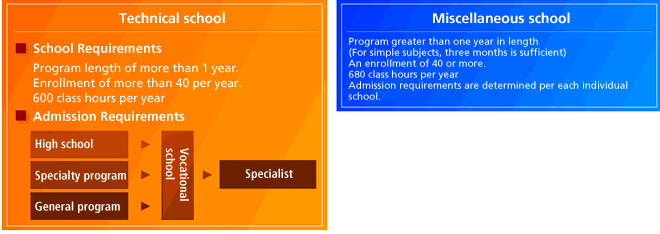Technical & Vocational Schools are institutes of higher education as defined by the national educational school law; their mission is to foster the necessary abilities in order to work effectively in a specific field of employment as well as advance an individual's own cultural identity.
In order to be officially recognized as a technical or vocational school under Japanese law, they are required to pass certain requirements and standards; in addition they must have a minimum one year program, more than 40 students, 600 class hours per year, and a certain number of teachers and appropriate facilities.
Specialty Certification was awarded to approximately 230,000 graduates of Technical and Vocational Schools in March 1995. Specialty certification is awarded to individuals based upon their performance, skills, and knowledge in a specific field of study by the Ministry of Education and Science.
Therefore, not every graduate is able to obtain a degree, to receive formal certification, graduates must; 1. Complete a two year course. 2. Attend 1700 hours worth of classes. 3. Pass all examinations specific to their field of study.
All NSG Colleges have been certified to award degrees to individuals who meet these criteria since March 1995 by the Ministry of Education and Science.
In April 1999, the Education Law was changed, and as a result graduates of two year vocational and technical schools are able to transfer to university with junior (Third Year) standing.. For example, if you are unable to decide what the best career path is for you, first you can attend a Technical or Vocational school to learn a specific skill or trade then transfer to university if you desire. Many students choose to follow this path, as it gives them not only a four-year University degree, but also a specialized qualification, in their field.
"Advanced Specialist Certification" refers to a higher level of certification, provided to individuals who have completed a four year program in a specific field. It is a desirable degree because to proves to potential employers that you have obtained higher skills and training. and to provide the opportunity to take an entrance examination to graduate school.


A certified school is one which has met the certain standards set out by law, and approved either by the National government, the prefectural board of education, or the prefectural governor.
A non-certified school will not have several advantages which certified schools are able to offer, these include; students discounts for public transportation, educational recognition,(i.e. official transcripts, scholarship eligibility from Japan Student Support Council( NIHONNGAKUSEI SHIEN KIKO)).
All NSG Colleges are certified by Niigata prefecture.






